Afghanistan – Part 8: Handan & The Night Shift
CONTINUED FROM>> About Us >>
I need to give some background on the job before getting to the stories.
Our primary objective in Shindand was to build a taxiway from the existing runway and link it to a couple of aprons (plane parking lots, essentially) that we would also build. Secondary projects included the expansion of the base perimeter fence and erecting two small buildings on the aprons. To build taxiways and aprons, we needed concrete. Lots and lots of concrete. In construction, as in life, “time is money,” but it would be more accurate to say, “concrete is money.” If you’re not pouring concrete, you ain’t making money. And airfield projects require a lot of concrete. To supply the concrete we needed, we assembled our own concrete batch plant. Our company owned a few batch plants in Afghanistan, and they would be assigned, as needed, to projects around the country. It is incredible that these massive structures were mobile, like enormous erector sets for giants. Each batch plant had a Turk in charge of it who was familiar with every nut and bolt and oversaw its construction and dismantling.

The two large silos pictured above held cement, and the small silo held something called silica fume – a strengthening agent added to concrete. The conveyor belt on the right of the photograph carried sand and gravel. Cement, silica fume, sand, gravel and water were all dumped in specific amounts into a mixer, which then spun into action to create a batch of concrete, hence the name, “batch plant.” Dump trucks then drove underneath the mixer (we also used mixer trucks, depending on the job), were filled, then drove immediately to the job site where they would deposit their load and head back to the batch plant for more. Depending on the job and amount of concrete needed in a given day, we would sometimes have 15 trucks running between the batch plant and the job site. The batch plant was the heart of our operation. Without out it we would be dead in the water.
The dump trucks carried their loads of wet concrete to a hulking paving machine made by the Gomaco Corporation in Ida Grove, Iowa.
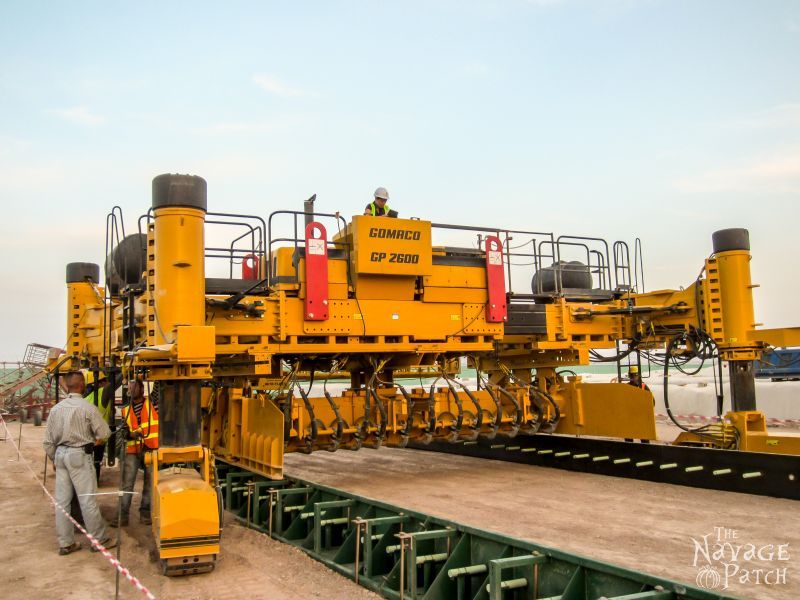
The Gomaco paved lanes of concrete, bounded by removable steel forms. The depth of the concrete varied depending on its intended use. A runway may get one meter (3 feet) of concrete. The aprons we built in Bastion were only about 6-8 inches thick, as they only needed to support parked helicopters. The taxiway at Shindand called for 45 cm concrete, or about 1 1/2 feet.
The Gomaco worked by running over piles of wet concrete dumped by the trucks and smoothing them out to the height of the metal forms.


Behind the Gomaco, a crew of workers further leveled and flattened the concrete with hand tools.

That is how we paved taxiways, back and forth, back and forth, one lane at a time. The Gomaco’s operating speed was much less than 1 mph, so this was not a quick process. While the days were (relatively) cool in the spring (meaning they weren’t yet topping 100F), we poured concrete during the day. But as temperatures soared in June, the concrete work had to carry on by night, otherwise the searing daytime heat combined with the dry air and windy conditions would dry out and crack the top layer of concrete before the rest of the pour had cured. That would lead to a weakened slab of concrete that we would eventually have to remove and repave. Pouring at night helped to prevent that.
*****
The reason Handan and I were sent from Bastion to this particular project was that it was behind schedule and over-budget almost from the get go. We arrived 2 1/2 months into a 9 month project, and nothing had been started yet. The original Turkish project manager was a disaster, and he was pulled after a month and a half. His replacement had a lot to learn and catch up on, so Handan was sent to help him out. Since she speaks nearly perfect English and native Turkish, she was a great liaison between the Turkish and the American parts of the joint venture. She could also interface directly and intelligently with the Army Corps of Engineers. I was pretty much a tag-along, but fortunately our company also needed a Health and Safety manager for that project. There was an Afghan temporarily in the position when we arrived, but he couldn’t get the project in line with the Army’s strict safety code, so having an American in the role was a big plus in the eyes of the Corps.
Handan’s official title was Quality Control Manager, but unofficially she was the Assistant Project Manager. She was able to get the project rolling, first by clearing a backlog of critical paperwork, and then by getting out to the site and motivating the Turks and the Afghans to get their butts in gear and start producing results. Her responsibilities, power and influence doubled one day when it became clear that the project’s Construction Manager wasn’t cutting the mustard: he was too lazy to motivate the men and didn’t seem to care that the project was behind schedule. The Corps of Engineers wanted him replaced. Handan spoke to our Project Manager and to some people in upper management at the head office in Turkey, then volunteered herself to replace the Construction Manager. She wasn’t offering to take his job and abandon the Quality Control Manager position, she was offering to keep her old position – a 10-hour-a-day job – and add to it the position of Construction Manager. She already had the blessing of the Army Corps of Engineers, and she also got the go-ahead from our Project Manager and the head office. She was the QC Manager by day and the Construction/QC Manager by night. Since we were pouring concrete at night, I also took on the mantle of double shifts. From June onward, our days began at 7 when we would wake up. We would dress and walk to the office where we would have breakfast and coffee. Handan worked all day in the office. I split time between the office and the site. We would quit the day shift between 5 and 6, have a shower, then head to dinner. After dinner, we relaxed until the temperatures dropped and the wind died down, anywhere from 7:30-9:00, then we headed back out for the night shift. Though the night crew worked until dawn, we would generally cash out around 3am so we could catch 3 or 4 hours of sleep before doing it all over again – thirteen days on, one day off.

One evening, there was a commotion next to the canteen where the truck drivers would park for dinner before heading out for the night shift. Handan and I had been in the canteen having dinner. When we came out, we saw all of the truck drivers, about 15 or 20 men, standing in a circle surrounding our Project Manager. Everyone was yelling. We ran over to make sure the PM was safe – he was a little guy, and the Afghans were angry. We learned that the drivers had just gone on strike, hours before they were all needed for a crucial concrete pour. The PM was outgunned and getting nowhere. Handan charged into the circle and started yelling, louder than all the rest. She spoke Turkish, a language all the drivers could understand. She told them all to walk over and meet outside the PM’s office where they could have a more civilized meeting. Five minutes later, Handan was standing on the stoop of the PM’s office, listening to their demand: double their pay or they walk. Handan yelled for quiet, then spoke.
“You will work, or you will all leave this job, this camp and this base immediately!”
She turned and went into the PM’s office, calling for each trucker to come in to meet with her individually. I watched as she spoke to each man one-on-one, her voice softer, her demeanor more relaxed and friendly. She made the men understand that if they left, not only would they never work on that base again, or for our company, but word would get out that they were the type of men who strike at crucial moments, and then no Project Manager would hire them. Every single man decided to stay on the job.
*****
I mentioned earlier that the batch plant was the heart of our operation. Late one afternoon in early June, our project went into cardiac arrest. The batch plant was in the process of loading materials into the mixer for a load of concrete to be poured for a drainage duct. That type of concrete could be poured during the day, since it was a less technical pour with less exacting specifications than the concrete needed for taxiways, runways and aprons. As the conveyor belt was carrying gravel to the mixer, it lost power and froze. Everyone scrambled to find the problem. The batch plant operator, a Turk named Serok, climbed up on the conveyor and inspected as he walked towards the mixer. There it was. An electrical cable had been severed. Unknown and unseen, the conveyor belt had been tracking off course for some time and had rubbed its way through a thick electrical cable that powered the conveyor. Serok radioed the problem to the PM: the batch plant was dead, and we didn’t have the cable to fix it. The cable would have to be located elsewhere in Afghanistan then driven by truck to Shindand – an estimated journey of three days. Three days of twiddling our thumbs while the project slipped further behind schedule. Three days of military-grade scowls from the Army Corps of Engineers.
Erdal, our Project Manager, canceled the night shift that night, much to the delight of the 300 Afghan workers. After dinner, most of the workers turned in early to catch up on some sleep.
The prospect of three days of inaction did not appeal to Handan in the least. She went to see Erdal.
“Erdal, I’m going to see if CH2M Hill [another contractor on base] has the cable we need.”
“Handan, this is crazy! If they have it, why would they give it?” Erdal said. They were competitors, and any misfortune we suffered would only make them look better when bidding time came around for the next project.
“Just leave it to me, Erdal. If they have it, I’ll get it.”
After dinner, I drove Handan over to CH2M Hill’s camp, and what a camp it was! Where as our camp was utilitarian, designed by Turks, and to be used for sleeping and working, CH2M Hill was an American contractor who’s camp was filled with Americans and another South African named Gerhard. The common area had tent poles and camo netting strung with multi-colored Christmas lights. They had an enormous inflatable pool, at least 20 feet across and 4 feet deep. They had a ping pong table, a huge flat-screen TV hooked up with an XBOX and speakers pumping out music. These guys had it made! Handan and I asked the first person we saw if we could speak to their Project Manager.
Handan spoke to their PM, and it turned out they had the type of cable we needed. Handan then asked if there was anything we could provide that they needed, so we could borrow the cable on trade. As it turned out, they needed gravel for their concrete. They didn’t have a batch plant, so they were mixing loads of concrete manually, and they were out of gravel. They were expecting more, but the trucks wouldn’t arrive for two days. Handan agreed to deliver them two dumper-loads of gravel that night in exchange for the cable. Once we were able to get our own cable, we would return theirs, and they would deliver two loads of gravel once theirs arrived.
Handan and I returned to our camp with the cable our electricians needed to make the repair. The electricians woke their assistants and got to work. By 10:30 PM they had completed the repair. Again, Handan went to speak with Erdal.
“Erdal, wake the workers. Let’s get to work.”
“Handan, this is crazy! They are sleeping. They will not wake up!” Erdal said.
“I’ll get them up. You wake the Turks.”
“Handan, you’re crazy! You’re dreaming!” Erdal said.
“Erdal, I will get them up. We will pour concrete tonight.”
Handan left Erdal’s office and went to the tea room to speak with the Mehmet, the tea boy. She sent Mehmet to the Afghan worker camp to bang on doors and tell everyone to get up for work, per order of “Handan abla,” or sister Handan. Everyone was up, dressed and at the job site in record time. From that night on, the workers began to see Handan as the leader, and we felt there was no goal we couldn’t reach if she said it could be done.
*****
The Corps came to trust and rely on Handan, but even they doubted her when she said we would finish and deliver the apron on time. We had five weeks until our promised delivery date. In those five weeks, we had three nights of pouring concrete, then 28 days of waiting. Poured concrete was tested after 7 days, 14 days and 28 days to ensure that it was curing properly. After 28 days, the project would be inspected and a “punch list” compiled, basically a list of things that needed to be fixed. Every project gets some kind of punch list. There are always problems, and they take time to fix – sometimes a lot of time. So looking at the number, you’re probably thinking that five weeks was more than enough time to finish that project. But there was a problem. Two, actually.
This was high summer, and the wind and dust storm season was spinning into gear. Three days from Handan’s promise, we were expecting weather conditions to deteriorate to the point where we wouldn’t be able to pour concrete, possibly for an entire month. Okay, we only needed three days to finish pouring concrete, so what’s the big deal, right?
Well, we had another, much bigger problem. We needed gravel, but we couldn’t get our gravel trucks into the base. Peace and stability in the region had been deteriorating rapidly over the past several weeks, and because of that, security at the gate had been beefed up considerably. Supply trucks that normally would have waited only a few hours were forced to wait days to get into the base. On top of that, the military informed us that they would be closing the gate completely for the upcoming weekend due to security concerns. We learned of the upcoming gate closure on a Wednesday – the same day Handan gave her promise to finish the project on time.
Here’s the thing with Handan: if she sets her mind to solve a problem or tells you that something will happen, you can bet your bottom dollar that the problem will be solved or the something will happen. Undeterred by our stranded trucks, the looming gate closure and impending storms, Handan grabbed a set of car keys and for three days took on a third job title: escort.
Every truck that arrived on base for our camp had to be escorted to our camp by a person working for us that had been vetted by the military. Our escort, Serdar, was known and well-liked by the soldiers working the gate, but he didn’t have the pull to get our trucks through the line. There were just too many other trucks, including military supply trucks, waiting to get in.
Then Handan showed up at the gate.
I don’t know exactly what she said to those soldiers (though afterwards we did have a few barbecues with those gate soldiers to celebrate finishing the apron), but they let her go out to the line of supply trucks, find those trucks that were delivering to our camp, and wave them to the front of the line. She then escorted them to our camp and drove back to the gate to get another group. For three days she did this, so we would have enough gravel to pour concrete those nights. When the gates were shut down on Friday night, our crew was out pouring the final lanes of concrete before the wind and dust kicked in with a vengeance.
After 14 days, our concrete had already far surpassed the strength threshold for 28-day concrete. The military agreed that waiting 28 days was not necessary to do the final inspection and punch list walk-through. They inspected the apron and found nothing wrong – not a single item for the punch list. The military still had to wait the full 28 days before using the apron – there was no cheating that timeline – but once we hit that 28 day mark, they could use the apron that very same day. Handan had finished and delivered the apron a week ahead of schedule. Once the 28 days had passed, the military was then able to use the taxiway and apron to accept those large aircraft I mentioned in an earlier post – the C-17 Globemaster. Here is a picture of the first C-17 to use the new taxiway. This picture was taken by our Corps liaison while riding in a helicopter. Though you can’t make us out, Handan and I are in the photo along with our Project Manager, Erdal and some of the management team from our joint venture partner: QC Manager David and Health & Safety Manger JoJo. This was a great day for all of us, and to top it off, we got to see the smiling faces of two busloads of soldiers boarding the plane to go home.

Here are some shots I took from the ground.

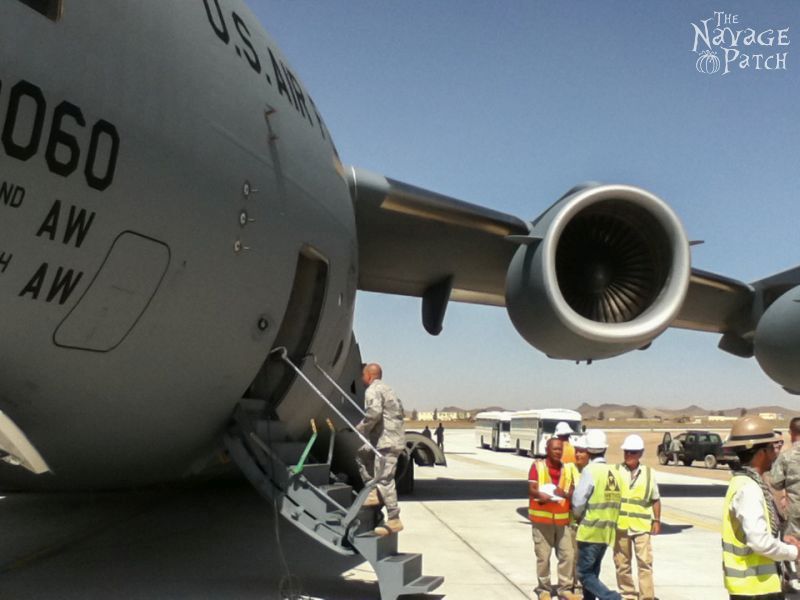





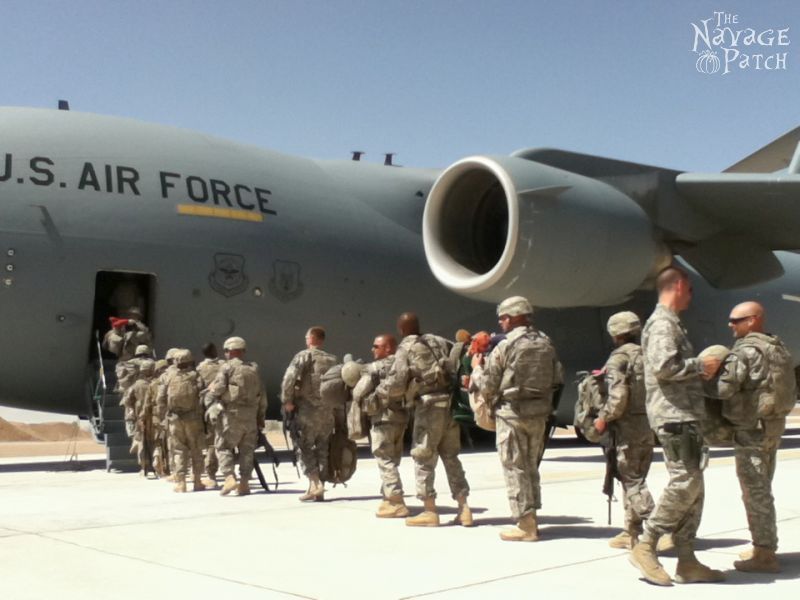

And a final shot of our crew.

CONTINUE ON TO>>

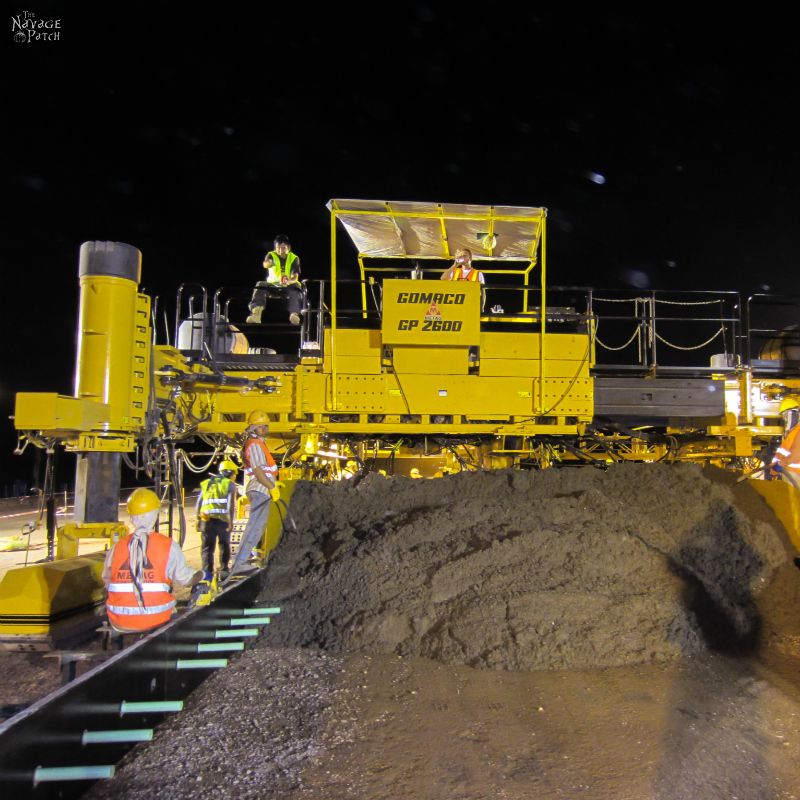




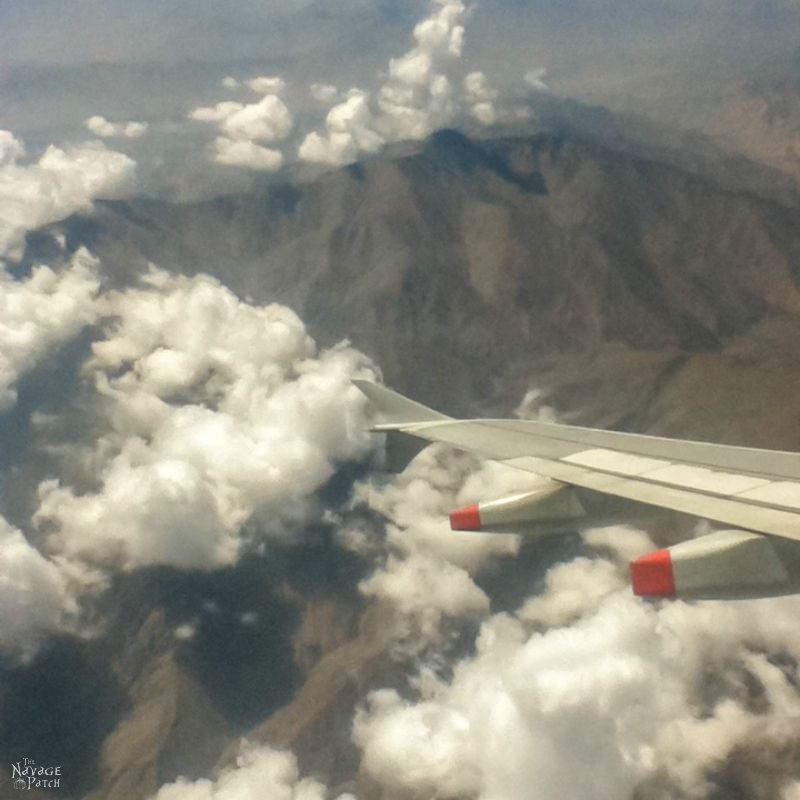
handan the magnificent lol she is a force to be dealt with, what an exciting life you too had xx
The funny thing, Chris, is that while Handan has the skills and guts to plan and budget the construction of an entire city, she’s a complete mess on the home front! Won’t go to bed unless I force her to, won’t wake up until I force to, won’t eat unless I put food directly in front of her, would always be late unless I force her to leave on time, and completely unable to budget her personal time – plans about 37 things to do on a typical weekend and finishes 3. It’s unbelievable! It’s like a 5 star chef coming home each night and not being able to boil water for tea! 🙂
And that is why I love you so much my babes!! Why do think I proposed to you before you got the chance to do it? I knew I could never find another man who would be patient enough to put up with me 😉
LOL. He is so right, Chris! 😀
Incredible!!!! I don’t know how you could work that many hours per day, especially under those conditions. Wow! Handan is something else. I see that she knows her stuff and is well respected by the work crew. You two certainly lived through quite a bit. Look forward to more installments. I enjoy reading about your adventuress .
Thank you so much, Melva! The next chapter should be exciting…it’s all about the attacks!
Handan never ceases to impress me! Not only can she run a company but she is crafty too! I love the way your writing exudes your love and respect for her! You two seem to make a great team!
She never ceases to amaze me, too!
I found your site 4 hours ago. Promised myself to just look around, and here I am 4 hours later. Your story is thrilling, and I love your writing style. It’s like being there. Love it. Especially poignant as my brother was in the Army and went to Afghanistan on two deployments. He is also an engineer, and his job was to build the bases or add to them. Your story and pictures hit home. God bless you.
Awesome! We’re so happy you found us and stumbled upon our story! Please thank your brother for his service and Handan and I wish you and your family a safe and happy Independence Day! 🙂